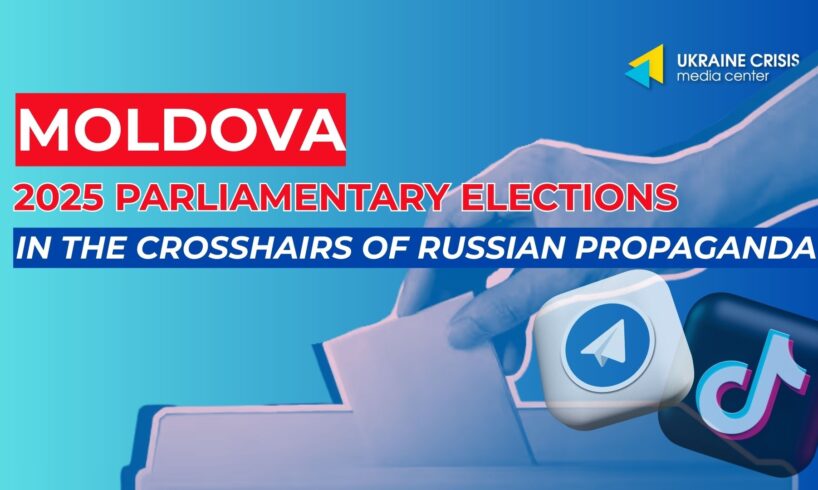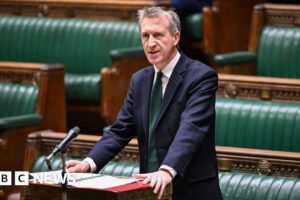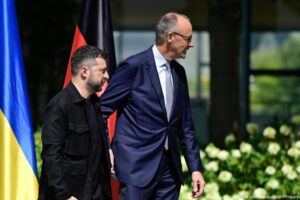
On September 28, the citizens of Moldova will elect a new composition of parliament. The elections attract keen interest, as the preservation of the country’s pro-European course is at stake.
Within the framework of this study, the Hybrid Warfare Analysis Group highlights the key trends and specific features of Russian propaganda’s influence on Moldova’s parliamentary elections, as well as describes the toolkit used by pro-Russian political actors to shape public opinion.
Bulletin on Moldova’s 2025 Parliamentary Elections
15 parties, 4 electoral blocs, and 4 independent candidates are taking part in the electoral race. The two largest political camps are formed by the ruling Action and Solidarity Party (PAS) and the opposition Patriotic Electoral Bloc (BEP).
On the eve of the elections, PAS builds its program around support for the government’s pro-European course and the policies of President Maia Sandu. A central leitmotif of the ruling party’s campaign is the topic of the Russian threat, the need to strengthen the security sector, and the continuation of support for Ukraine.
The main opponent of the government, the Patriotic Electoral Bloc (also Patriotic Bloc, BEP), was formed in early August 2025 by four political forces: the Socialists, the Communists, as well as the Heart of Moldova Republican Party and the Future of Moldova Party. The faces of the Patriotic Bloc are Igor Dodon (President of Moldova in 2016–2020, leader of the Party of Socialists of Moldova), Vladimir Voronin (President 2001–2009, long-time leader of the Communist Party), Irina Vlah (Bashkan of Gagauzia in 2015–2023, head of the Heart of Moldova Republican Party), and Vasile Tarlev (Prime Minister 2001–2008, leader of the Future of Moldova Party).
All four parties are united not only by their left-wing ideology but also by loyalty to Russia. In its program, the BEP declares economic and political rapprochement with Russia, the consolidation of permanent neutrality (in practice, a rollback of cooperation with NATO), and the granting of official status to the Russian language. Accordingly, the BEP appeals to segments of Moldovan society nostalgic for the Soviet past or disillusioned with the dynamics of Moldova’s European integration.
Congress of the Patriotic Electoral Bloc, August 2025
According to forecasts, the Alternative Bloc and Our Party also stand a good chance of entering Moldova’s parliament.
Alternative advocates a pro-European course but at the same time criticizes the authorities for inefficiency in negotiations with the EU. The bloc’s headliners are Ion Ceban (incumbent mayor of Chișinău), Alexandr Stoianoglo (main opponent of Sandu in the second round of the 2024 presidential elections), and former prime minister Ion Chicu. In the pre-election configuration, Alternative plays the role of a spoiler party, whose strategy is based on pulling into its own pool the pro-European-oriented electorate disillusioned with government policies and the dynamics of negotiations with Brussels.
Our Party is led by former mayor of Bălți Renato Usatîi. Usatîi does not declare a clear ideological orientation or geopolitical priorities. Instead, within the framework of the current campaign, the politician flirts with the electorate that has pro-Russian sentiments. Therefore, in expert circles, there are assessments that Usatîi’s campaign is in fact a political technology maneuver by the authorities aimed at fragmenting the electoral field of the pro-Russian opposition.
Other parties and blocs, according to polls, will not cross the electoral threshold.
Competition of Polls
It is worth noting that on the eve of Moldova’s elections, a “battle of opinion polls” has unfolded. Contestants are circulating ratings favorable to themselves, aiming to encourage voters to turn out more actively. Unsurprisingly, the results of polls currently circulating in Moldova’s information space differ significantly, even when taking margins of error into account.
For example, according to an iData poll – widely disseminated by media loyal to the opposition – 36% of voters are ready to support the Patriotic Bloc, while 34.7% would vote for PAS. In contrast, a survey by the WatchDog.MD community and the CBS Research Center, conducted between September 6 and 13, 2025, shows PAS securing 29.7% support, while the Patriotic Bloc would receive only 13.2%.
An example of a manipulative “popular” poll in which pro-Russian parties convincingly prevail
(in reality, the voting took place on a website supporting the opposition)
In our view, beyond party ratings, indicators of trust in politicians also deserve attention. Moldovan parties retain features of a leadership-centered model – personal qualities and the public stance of political leaders often matter more to voters than party programs or ideological positions. Therefore, the research results presented below from WatchDog.MD illustrate the trends of support for political forces within Moldovan society.
Trust Ratings of Moldovan Politicians (WatchDog.MD survey, September 6–13, 2025)
As of September 2025, President Maia Sandu holds the highest trust rating, with 23.9% of respondents expressing full trust in her and another 23.6% expressing partial trust. Former President Igor Dodon (Patriotic Bloc) and Chișinău Mayor Ion Ceban (Alternative) each secured the trust of roughly one-third of respondents. Slightly lower trust ratings are recorded for Alexandr Stoianoglo (Our Party) and Irina Vlah (Patriotic Bloc).
Notably, support (full and conditional) for the most controversial pro-Russian politicians – Ilan Shor and Victoria Furtună (Greater Moldova Party) – remains rather low, at 16.8% and 12.8% respectively. It is worth highlighting that among the public figures included in the ranking, Shor holds the highest disapproval rating (65.6%), while Furtună remains unknown to more than a third (32.4%) of Moldovan citizens.
The complexity of pre-election polling in Moldova is linked to the large share of voters residing abroad. For instance, in the 2024 presidential election, 327,000 voters participated in the second round of overseas voting (out of a total electorate of 3.2 million). Moreover, the separatist enclave of Transnistria, with 277,000 registered voters, can be surveyed mainly through telephone polls, which narrows the methodological scope of sociological research.
In summary, the most likely scenario is the loss of a parliamentary majority by PAS. However, this would not necessarily lead to a loss of power, as under such a scenario a coalition government could be formed.
Kremlin’s Favorites
The parliamentary elections in Moldova are taking place under conditions of societal polarization and external informational pressure from Russia. Statements by government representatives indicate a high level of concern in Chișinău about possible Moscow interference in the electoral process. In previous years, Kremlin curators developed a pattern of infiltrating Moldova’s political landscape with party projects designed to directly lobby Russian interests, while local political elites were subject to ongoing corruption.
According to Russia’s initial plan, the role of the Kremlin’s “Trojan horse” in this year’s elections was to be played by the “Victory” bloc of fugitive oligarch Ilan Shor, who is hiding in Russia. Shor has been prosecuted in his homeland since 2017 on corruption charges, and in recent years he has been sanctioned by both the U.S. and the EU for his links to Russian intelligence services.
It should be recalled that the “Victory” political project was established in April of last year on the basis of Moldova’s most notorious pro-Russian forces (the SOR Party, Revival, Chance, Alternative and Salvation Force of Moldova, and Victory). At the start of the current campaign, on July 6, 2025, a congress of the “Victory” bloc was held in Moscow, where Shor declared that the “only salvation” for Moldova was a “union” with Russia.
Ilan Shor at the congress of the Moldovan opposition bloc “Victory,” Moscow, June 2024
However, the direct threat of Russian interference through the Kremlin puppets from the “Victory” bloc was soon neutralized. The Central Electoral Commission barred Shor’s candidates from the elections due to multiple registration violations. Moreover, on August 11, 2025, Moldova’s Ministry of Justice filed a case with the Court of Appeal against four of the parties comprising the “Victory” bloc.
Under these conditions, Moscow is compelled to place its main bet on the loyal Patriotic Bloc, which still retains a theoretical chance of shaping the government, unlike Shor’s fully controlled but marginal project.
Social media as a battleground for election campaigns
According to opinion polls, social media is the main source of information for 63% of Moldovans. It is only natural that social platforms have become an arena for election campaigns. According to a WatchDog.MD public opinion survey, 55.5% of respondents get their news from Facebook. In second place is TikTok with 26.9%, followed by YouTube (22.5%), while Telegram (13.4%) and Instagram (9.2%) round out the top five social networks that Moldovans turn to for news.
Which social network do you use to get news? (WatchDog.MD survey, September 6–13, 2025)
The Hybrid Warfare Analytical Group focused its research on two platforms: Telegram and TikTok. As experience in monitoring Russian propaganda shows, these platforms are used to promote Russian propaganda narratives and manipulate public opinion. Moreover, Telegram and TikTok are most actively used in the field of political advertising and election campaigning in Moldova.
Telegram messenger has established itself among the most popular online platforms in Moldova in 2024-2025. According to estimates by the Moldovan Cybersecurity Agency, there are about 1-1.5 million Telegram users in the country. According to SimilarWeb, Telegram is the second most popular messenger in Moldova, second only to WhatsApp. Among the Telegram channels operating in the Moldovan segment, there are official sources, independent media channels, and a network of anonymous pages associated with various political forces. According to Detector Media, the most popular pro-Russian Telegram channels are Pridnestrovets (Russian-language, dedicated to Transnistria) – over 73,000 subscribers, Kishinev v Teme (approx. 69,000), dedicated to Gagauzia, the channel Gagauzskaya Respublika (31,000), and the channel of the Russian state media Sputnik Moldova (27,000). Monitoring by the Hybrid Warfare Analytical Group also shows that the Russian-language channels Moldova Sraz (33,000) and Moldavsky Krot (29,000) are actively supporting the Patriotic Electoral Bloc. (Telegram-channels numbers are indicated as of mid-September 2025).
A common feature of these and less numerous channels is the anonymity of administrators and the consistency of content: investigations show that such channels are often coordinated, repost each other’s content, and are included in shared Telegram folders. At the same time, some of the pro-Russian Telegram pages dedicated to Moldovan politics are coordinated by structures controlled by fugitive oligarch Ilan Shor.
By early 2024, TikTok had became the most popular social network in Moldova in terms of user numbers – 1.58 million (aged 18 and over), ahead of Facebook (1.3 million) and Instagram (1.03 million). TikTok’s advertising coverage reached 60.6% of adult citizens of Moldova.
Mediacritica’s monitoring shows the platform’s active involvement in political campaigning during the parliamentary elections. According to the study, between July 1 and 15 of this year, 51 Moldovan TikTok channels published hundreds of manipulative videos, which collectively garnered over 42 million views during that period.
Ahead of the 2025 parliamentary elections, the pro-Russian opposition is actively exploiting TikTok to attract voters. According to the Context.ro portal, opposition party leaders are gaining millions of views on TikTok by promoting anti-European narratives and discrediting the pro-European government.
Video interview with Igor Dodon, posted on his TikTok page. In this excerpt, the opposition leader tells horror stories about how, if the ruling party wins, the European Union will force Moldova to fight alongside Ukraine against Russia
It is important to note that after the precedent surrounding last year’s presidential elections in Romania (according to reports from the Romanian authorities, the result of the first round winner Calin Georgescu could have been the result of a manipulative campaign on TikTok that violated electoral law), discussions began in Moldova about the influence of TikTok on the results of the vote. At the end of last year, Moldovan Parliament Speaker Igor Grosu said that TikTok could be blocked if it posed a threat to national security, while media regulator Liliana Vitu called TikTok a «tool of foreign interference» and called for tighter regulation. At the same time, Prime Minister Dorin Recean advocated cooperation with the platform to remove toxic content instead of a complete ban. Experts agree that TikTok poses a threat to information security.
On the eve of the current elections, the head of the Ministry of Internal Affairs of the Republic, Daniela Misael-Nikitin, stated that TikTok and Telegram are actively used to spread disinformation. At the same time, while the former platform cooperates with the authorities, Telegram ignores requests. It is noteworthy that shortly before the elections, as part of efforts to counter the spread of disinformation, a specialized unit of the Moldovan police was created, tasked with identifying harmful content on social networks.
At the same time, the Moldovan authorities did not go down the path of banning social networks or individual channels. Instead, they went with a strategy of engaging with voters on TikTok – both through politicians’ official pages (like the one for Parliament Speaker and PAS leader Igor Grosu) and by bringing in popular video bloggers. This approach is expected to attract young voters and reduce the level of domestic political tension caused by public fears of restrictions in the digital sphere.
Russian Disinformation in Moldova’s Parliamentary Elections
Criticism of the Pro-European Course
Moldova’s largest opposition force – the Patriotic Electoral Bloc – relies on an electorate largely skeptical about European integration. According to polls, up to one-third of Moldovan citizens currently oppose the country’s EU membership (while around 60% hold the opposite view, supporting a European foreign policy vector). Strategists of the Patriotic Bloc recognize an obvious fact: mobilizing only opponents of the European course is insufficient for electoral victory.
An objective assessment shows that curtailing European integration is economically disadvantageous for Moldova, as neither Russia, under wartime conditions, nor China (whose annual trade turnover with Moldova remains a modest $1.5 billion by Chinese standards) will not «pay» for Chisinau’s geopolitical 180-degree turn. Consequently, opposition leaders criticize the government for “inefficiency” in negotiations with the EU and for allegedly sacrificing “national interests to please Brussels,” while generally avoiding sharp escalatory rhetoric directed against the EU.
A notable novelty in the current campaign’s anti-European discourse is the comparison with Georgia and attempts to “link” public fear of war with the theme of EU integration. Speakers of the Patriotic Bloc present Georgia’s example as an optimal “role model” for Moldova under current geopolitical conditions. In the opposition’s interpretation, Georgia’s ruling party – Georgian Dream – supposedly demonstrates consistent defense of national interests and traditional values under EU pressure.
This analogy gained traction after recent statements by Romanian President Nicușor Dan, who warned that if pro-Russian forces come to power in Moldova, the country would face problems with European integration or could even be dragged into war. In response, media aligned with the Patriotic Bloc disseminated a statement by opposition leader Igor Dodon: “The main lesson from Georgia’s experience is that behind the EU’s fine promises, there may be war. Nobody in the European Union is waiting for Moldova. Maia Sandu knows this. Her task is to push the country into conflict, while she herself will be safe in the West.”
Another example of an attempt to “sell” voters on a tough negotiating stance with Brussels is the “manifesto for the protection of traditional values, faith, and sovereignty” published by Dodon’s “colleague” in the Patriotic Bloc, Vasile Tarlev. The document asserts that Moldova faces a choice: to preserve identity, traditions, and unity, or to lose its soul under the guise of “modernization” and “integration” (a clear reference to EU membership).
Thus, within its campaign, the Patriotic Bloc demonstrates readiness to effectively freeze negotiations with Brussels (the so-called Georgian scenario), while not officially rejecting the pro-European course.
A further tool for discrediting the EU in the current campaign has been accusations against Brussels of veiled “financing” of the ruling party’s electoral campaign – Patriotic Bloc representatives interpret EU financial assistance tranches for reforms in Moldova in precisely this way.
Fear of War as a Political Technology
The fake narrative about the European Union “dragging” Moldova into a war with Russia is toxic for Moldova’s domestic political discourse in the post-election period. Within the Patriotic Bloc’s campaign materials, the topic of the Russian-Ukrainian war serves as a tool to discredit Chișinău’s pro-Western course. Pro-Russian politicians manipulate fears of Russian military intervention in the event of the current government’s continuation of its foreign policy. At the same time, the Patriotic Bloc avoids any assessment of Russia’s invasion of Ukraine, and party spokespeople evade commenting on existing or potential threats to Moldova caused by the Kremlin’s attack on Ukraine in 2022.
Instead, the pro-Russian opposition tries to construct an image of the authorities as “warmongers.” Telegram channels aligned with the Patriotic Bloc regularly publish claims that Moldova’s government is preparing to escalate the situation in Transnistria if it loses the parliamentary elections. Moreover, some opposition figures spread the fabrication of an alleged EU “integration requirement” for Chișinău to regain control over the separatist enclave.
An example of manipulative use of the Russia-Ukraine war theme in a campaign video of the Patriotic Electoral Bloc
Against the backdrop of intensified criticism of European integration, pro-Russian forces have stepped up their opposition to Moldova’s cooperation with NATO. Despite the fact that Sandu has officially declared no plans to reconsider Moldova’s neutral status, recent weeks have seen street protests against NATO’s alleged “expansion” into Moldova. During elections in Moldova, local pro-Russian opposition figures regularly pull the propagandist myth about the “aggressive NATO bloc”, as the majority of the republic’s citizens express opposition to NATO membership. At the same time, in the Patriotic Bloc’s campaign rhetoric, the image of the main antagonist within NATO has shifted from the United States to the European Union, reflecting the latest trends in Russian propaganda.
Protest against NATO “expansion,” Chișinău, September 2025 (the participants’ body language clearly indicates the staged nature of the rally)
Conspiracy Theories Ahead of the Elections
Throughout September 2025, Russia carried out a series of information attacks through its own disinformation channels. One example of such influence campaigns was an attempt to provoke the U.S. administration into expressing negative assessments of Moldova’s incumbent government and president. On September 11, Ukrainian pro-Kremlin propagandist Diana Panchenko (before 2022, she was the “face” of a pro-Russian Ukrainian TV channel, and after the full-scale invasion moved to Russia) published an open letter to U.S. President Donald Trump on her Telegram channel (400,000 subscribers).
In the letter, Panchenko attempts to warn the American side about the alleged efforts of “European hawks” to drag Moldova into Russia’s war against Ukraine. The document claims that France and the United Kingdom had supposedly developed a joint plan with Moldova to escalate tensions in Transnistria. It refers to a cooperation plan signed in Paris on June 12, 2025, between the General Staff of the National Army of Moldova and the French Defense Staff, which allegedly contained a hidden section on preparing provocations against Tiraspol.
According to the letter, President Maia Sandu allegedly agreed Moldova’s involvement in this “geopolitical adventure” during behind-the-scenes contacts with RUSI in London. After the parliamentary elections, Sandu is said to be ready to authorize an operation by Ukrainian forces against Transnistria. The document further emphasizes that Moldovan intelligence and state structures are integrated with Ukrainian ones under the leadership of British intelligence services.
The letter also accuses President Sandu of controlling the judiciary, the media, and of using external support (particularly from France and EU institutions) to manipulate the elections. Panchenko concludes that Sandu is deliberately leading the country into direct confrontation with Russia and calls for international attention to stop the alleged “escalation plan.”
In practice, Panchenko herself became the sole promoter of this conspiracy theory, while other pro-Kremlin Telegram channels merely reposted the “letter to Trump.” At the same time, the Kremlin’s fabricated “plan” was circulated in Russian media under the label “Anti-Trump Plan” – apparently to imply a “conspiracy” by Sandu, Zelenskyy, and European leaders against the U.S. president.
On August 25, 2025, Diana Panchenko appeared on the YouTube project Morari.live, which provides media support to the pro-Russian Patriotic Electoral Bloc
However, Washington ignored this disinformation stunt. Panchenko’s opus also did not impressed international media. As a result, the Kremlin decided to involve Russia’s Foreign Intelligence Service (SVR) in spreading the fake. On September 22, pro-government Russian Telegram channels, citing the SVR, disseminated claims about “NATO countries preparing a military operation to occupy Moldova.”
Kremlin’s intelligence service’s statement alleged that such a scenario had been rehearsed during NATO exercises in Romania and could be carried out after Moldova’s parliamentary elections on September 28. Russians further claimed that, due to “gross falsifications,” Moldovan citizens would be forced to take to the streets in protest. In response, Sandu would supposedly invite European armies into Moldova “to force Moldovans to accept dictatorship.”
The SVR also invented a “Plan B” for the “European interveners,” asserting that the next date for Moldova’s “occupation” could be November 30, when pseudo-elections are scheduled in Transnistria. According to the Russians’ so-called “intelligence,” this period would see armed provocations against Tiraspol.
This conspiracy theory of the Russian intelligence service was picked up by numerous Russian Telegram channels, highlighting the planned and coordinated nature of the information influence campaign. On September 23, the SVR’s statement on Moldova became one of the most widely shared items in the Russian social media news segment. Pseudo-Ukrainian channels coordinated by Russians also amplified the fake. For example, the channel Legitimny (1,133,000 subscribers) published a post that expanded on the SVR’s claims, alleging that the Office of the President of Ukraine, with the involvement of Western military advisers, was preparing an “attack on Transnistria.”
Preparation for Further Escalation
Growing numberof escalation scenarios in Moldova’s information space points to Moscow’s preparations for attempts to destabilize the region in the post-election period. This is indicated by the organization of several public rallies led by pro-Russian figures. At present, the main slogans of the opposition concern demands to increase the number of polling stations in Transnistria and Russia, as well as the release of Gagauzia’s bashkan, Evghenia Gutsul, who was detained in the spring of this year on charges of illegally financing the Kremlin-backed political project – the SOR Party.
If Russia succeeds in discrediting or disrupting the voting process through information manipulation, Moscow is likely to try to trigger a wave of protests demanding the resignation of the current government and president. Signs of preparation for such an information attack include an increased number of reports about cyberattacks targeting Moldovan government officials. However, most of these so-called “hacker revelations” are, in fact, crude fabrications by propagandists.
The latest examples of this fake-news technique – spreading disinformation under the guise of “data obtained by hackers” – include reports about a letter allegedly sent by the Speaker of Parliament to the Constitutional Court regarding the possible annulment of the election results, as well as about alleged correspondence between MPs from PAS and Alternative, which supposedly contained documents pointing to President Sandu’s psychiatric diagnosis. Notably, a similar fake about treatment for mental disorders was circulated against German Chancellor Friedrich Merz during the Bundestag elections in February 2025.
Protests in Gagauzia in support of Bashkan Evghenia Gutsul
In summary, the following key trends can be identified in Russia’s disinformation campaign regarding Moldova’s parliamentary elections:
Use of the war threat to influence voter behavior. The central topic of the pro-Russian political forces’ campaign is the claim that the current government’s course is leading Chișinău into armed conflict. Moscow-oriented opposition actors attempt to link the theme of European integration in the public consciousness to fears of Moldova being dragged into war. At the same time, the continuation of the pro-EU course despite Russian pressure is portrayed as a negative scenario (through analogies with Ukraine) and contrasted with the “Georgian scenario” – a so-called pragmatic model of relations with Brussels that, in practice, means freezing EU membership talks to please Russia.Active involvement of Russian information actors in spreading propaganda narratives. The direct use of Russian propagandists and the Russian Foreign Intelligence Service (SVR) highlights the Kremlin’s intent to retain part of Moldovan society within a Russia-controlled information space.Design of information influence campaigns for the post-election period.
The Kremlin’s information efforts around the current parliamentary elections form part of a broader, long-term, multi-level strategy to regain control over Moldova. Paid protest actions and attempts to discredit the authorities – including the dissemination of fake compromising fakes disguised as hacker leaks – indicate preparations to destabilize Moldova’s domestic political situation.
Authors: Volodymyr Solovian, Mykyta Kuzmenko





